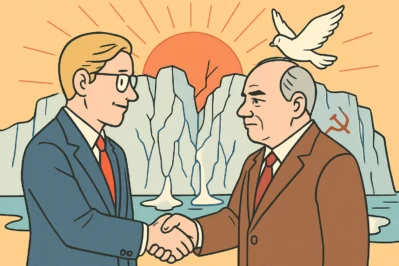From Bipolarity to a New Dawn: Discussing the Malta Summit in Korean
Hello! Welcome to [Maeil Hangeul], your trusted partner in upgrading your Korean to the highest level!
Today, we’re diving deep into a pivotal moment in world history: the 1989 Malta Summit, where the end of the Cold War was declared. Why discuss this? Because being able to talk about complex historical and political events is a true mark of an advanced Korean speaker. Recently in Korea, there’s been renewed academic and public interest in the post-Cold War international order and its direct impact on the Korean peninsula’s security landscape. Understanding this vocabulary will not only elevate your Korean but also give you a profound insight into the discussions happening in Korean news, academic circles, and documentaries today.
Let’s learn how to discuss this world-changing event like a true expert!
Core Expressions for Advanced Discourse
Here are the essential terms you need to master to discuss the end of the Cold War.
- 한국어 표현: 탈냉전 (脫冷戰)
- 발음 [로마자]: Tal-naeng-jeon
- 영어 뜻: Post-Cold War era
- 상세 설명: This is a high-level term composed of Hanja. 탈 (脫) means to ‘escape’ or ‘break away from,’ and 냉전 (冷戰) means ‘Cold War.’ Together, it refers to the era after the collapse of the Cold War system. The prefix ‘탈-‘ is incredibly useful in advanced vocabulary, often meaning ‘post-‘ or ‘de-‘ (e.g., 탈권위주의, post-authoritarianism; 탈공업화, de-industrialization). Using this word immediately signals a high level of academic and political vocabulary.
- 한국어 표현: 종식을 선언하다 (終熄을 宣言하다)
- 발음 [로마자]: Jong-sig-eul seon-eon-ha-da
- 영어 뜻: To declare the end of~
- 상세 설명: This is a very formal and powerful phrase. 종식 (終熄) means ‘cessation’ or ‘end,’ typically used for major conflicts, eras, or epidemics. 선언하다 (宣言하다) means ‘to declare’ or ‘proclaim.’ While a simpler way to say something ended is ‘끝나다,’ using ‘종식을 선언하다’ is appropriate for historical declarations and official statements, adding a layer of gravity and formality to your speech.
- 한국어 표현: 양극 체제 (兩極 體制)
- 발음 [로마자]: Yang-geuk che-je
- 영어 뜻: Bipolar system
- 상세 설명: This is the specific term for the geopolitical structure of the Cold War, dominated by two superpowers (the US and the USSR). 양 (兩) means ‘two/both,’ 극 (極) means ‘poles,’ and 체제 (體制) means ‘system.’ Understanding this term is crucial for any discussion on international relations during the 20th century. It contrasts with ‘다극 체제 (dageuk cheje),’ the multipolar system that followed.
- 한국어 표현: 군비 축소 (軍備 縮小)
- 발음 [로마자]: Gun-bi chuk-so
- 영어 뜻: Arms reduction / Disarmament
- 상세 설명: A key topic of the Malta Summit. 군비 (軍備) refers to military armaments, and 축소 (縮小) means ‘reduction’ or ‘downsizing.’ This term is frequently used in news and academic articles concerning diplomacy, peace treaties, and international security negotiations.
Example Dialogue: A Historical Discussion
Let’s see how these expressions are used in a conversation between two history graduate students, A and B.
A: 1989년 몰타 회담이 탈냉전 시대의 본격적인 서막을 열었다고 평가되잖아요.
A: The 1989 Malta Summit is widely regarded as having opened the curtain on the Post-Cold War era, right?
B: 맞아요. 부시와 고르바초프가 공식적으로 냉전 종식을 선언한 역사적인 순간이었죠. 수십 년간 지속된 양극 체제가 막을 내리는 상징적인 사건이었어요.
B: Exactly. It was a historic moment when Bush and Gorbachev officially declared the end of the Cold War. It was a symbolic event that concluded the bipolar system that had lasted for decades.
A: 그 회담을 계기로 미소 간의 전략 무기 감축 협상, 즉 군비 축소 논의도 급물살을 탔고요.
A: And that summit served as a catalyst, rapidly accelerating the strategic arms limitation talks between the US and the USSR—in other words, the discussions on arms reduction.
B: 네, 하지만 그 영향은 전 세계에 고르게 미치지 않았죠. 특히 한반도에는 또 다른 과제를 안겨주었고요.
B: Yes, but its impact wasn’t felt evenly across the globe. It presented a different set of challenges for the Korean Peninsula, in particular.
Cultural Tip & In-depth Analysis: The Cold War’s Lingering Shadow
Here’s something that will make you sound like a true Korea expert. While the world celebrated the 탈냉전 (Tal-naengjeon), the Korean Peninsula is often referred to by scholars and journalists as ‘냉전의 마지막 섬’ (the last island of the Cold War).
Why? The collapse of the global 양극 체제 (yang-geuk cheje) ironically solidified the division of Korea. North Korea lost its primary patrons in the Soviet bloc, leading to deeper isolation and a more rigid stance. Therefore, when you hear Korean analysts discuss the end of the Cold War, it’s often with a complex, bittersweet nuance. They acknowledge the global shift but immediately connect it to the unique and unresolved reality of the Korean division. Using a phrase like “세계적으로는 탈냉전 시대가 도래했지만, 한반도에는 여전히 냉전의 유산이 깊게 남아있다” (Although the Post-Cold War era arrived globally, the legacy of the Cold War still remains deeply entrenched on the Korean Peninsula) in a discussion will demonstrate a sophisticated understanding of modern Korean history.
Let’s Review and Practice!
Great job! Today, we learned four advanced expressions—탈냉전, 종식을 선언하다, 양극 체제, 군비 축소—to discuss the end of the Cold War with depth and precision.
Now, it’s your turn to practice!
- Fill in the blanks:
1989년 몰타 회담은 미소 양국이 ______의 ______을/를 공식적으로 __________ 역사적 사건이다.
(Hint: Use three of the expressions we learned today!) -
Short Answer:
In your own words, briefly explain why the Korean Peninsula is sometimes called ‘냉전의 마지막 섬’ (the last island of the Cold War). Try to use at least one of today’s key terms in your explanation!
Leave your answers in the comments below! We’d love to see you put your new vocabulary to use. Keep up the fantastic work






